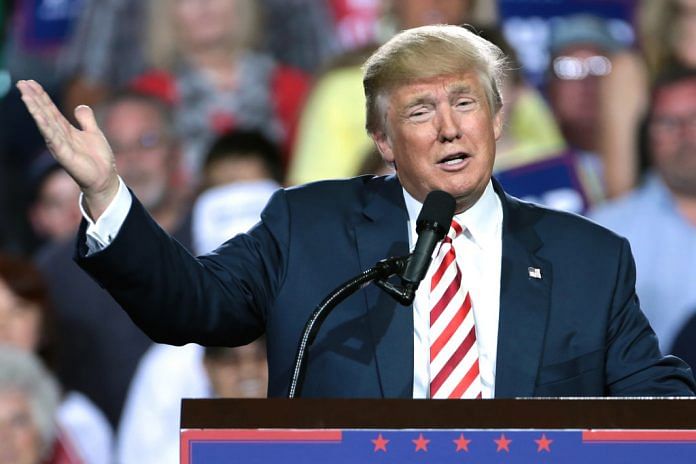Trump’s befuddling dalliance with the Democrats
In the last 48 hours, Donald Trump has left both the Republicans and Democrats confounded. Except the Republicans are also livid, while the Democrats are slightly wary. In the last two days, the president has cut a deal with the opposition party to keep the government funded while raising the country’s borrowing authority, furthered dialogue with a senior Senate Democrat on a permanent debt ceiling solution and also heeded to the advice of the top House Democrat, when he urged him to allay the anxieties of young undocumented immigrants on Twitter.
“Haven’t seen anything like it before…I have no way of divining his motives,” a senator said. While the Republicans, who are nervous about the 2018 mid-term elections in the wake of the newly found dalliance, are fuming privately, the Democrats are not overjoyed either. Although they’re asserting themselves more strongly than before, there is an implied acknowledgement that the president’s overtures could be short-lived.
Prejudice and discrimination are keeping British Muslims away from jobs
Young British Muslims “face an enormous social mobility challenge and are being held back from reaching their full potential at every stage of their lives,” a new study by the Social Mobility Commission has stated. The reasons? Islamobhobia, racism and discrimination. The result is unemployment, underemployment or just insecure employment.
“Muslims are excluded, discriminated against, or failed, at all stages of their transition from education to employment,” the professor who led the research said. Around three million Muslims live in the UK, out of whom, only 20 percent are in full-time work. “Higher managerial, administrative and professional occupations” are even rarer, with only 6 percent Muslims making it to the category. Women, as always, are even more vulnerable. They are three times more unlikely to be unemployed, with hesitance to wear headscarves to work an obvious issue.
Pyongyang and Islamabad’s decades-old ties
North Korea has seldom given much heed to international support and alliance-building. But since the 70s, it has had a mutually beneficial ally in Pakistan. As Pyongyang continues to get increasingly isolated in the international community, it is only natural for it to look towards the few countries it has enjoyed formidable relations with – a list which remains incomplete without Pakistan.
This piece in Dawn, takes the reader through the decades of the Pyongyang-Islamabad relationship, which has always been seen by the West with a pinch of salt. While the two countries developed diplomatic ties in 1972, the highpoint of their relations came in 2002, when allegations of Pakistan helping Pyongyang develop a nuclear bomb gained weight. In the wake of North Korea’s sixth nuke test, Pakistan issued a carefully guarded condemnation at a time when both countries are facing growing hostility from the US, and an increasingly measured, conditional support from China.
Pyongyang’s belligerence is giving South Korean president a hard time with his voters
There was another country, a traditional foe, which had sought to foster warmer relation with Pyongyang, but seems to be failing at it. South Korea’s few months-old president came to power advocating dialogue with its northern neighbour. But given that Pyongyang has significantlystepped up its nuclear and missile programs, Moon Jae-in has been “sandwiched” between his campaign promises and the realities of dealing with a hostile neighbor.
“Given North Korea’s continuous provocations, now is not the right time for dialogue. Rather, it is time to tighten the screws on North Korea with a view to forcing the regime to change its strategic calculation,” a government official said. But Moon’s supporters who expected him to be “different” are disappointed and frustrated. “There were candlelight demonstrations, a historical movement, that granted power to Moon. So they think Moon should be different…So far, he is unexpectedly hard-line,” a key foreign policy adviser to Moon’s presidential campaign said.
Religious schooling has little to do with militant recruitments in African countries: UN study
Contrary to popular opinion, many young Africans drawn to extremist groups like Boko Haram and al-Shabab know “little to nothing” about religious texts. A new UN study, a first of its kind, which profiled nearly 500 voluntary recruits to the two militant groups, has revealed that religious schooling, in fact, reduces the likelihood of radicalisation.
Receiving “at least six years of religious schooling is shown to reduce the likelihood of joining an extremist group by as much as 32 percent,” the researchers said. Instead, finding a job was documented to be the acute and immediate need of the recruits before taking to militant groups. Other contributing factors included unhappy childhood, lack of parental supervision or the killing or arrest of a family member or friend. In fact, 70 percent of the respondents cited some form of government action as the “tipping point” before the final leap.



